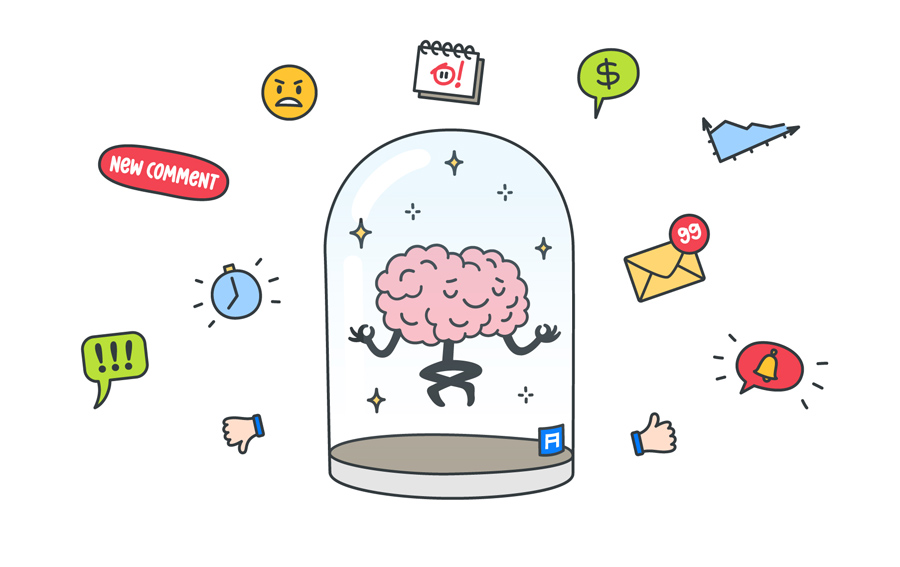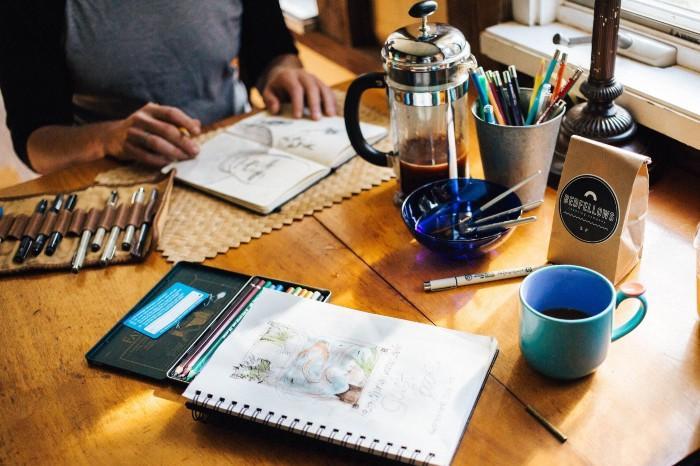Tips on how to free your mind and increase your creativity

Consumption of information reduces creativity - the brain needs to rest
“In order to truly cherish things that are important to you, you must first get rid of those that have already survived their destiny. Throwing away what you no longer need is not wastefulness and not a shameful act. ”
Such advice was given by Marie Kondo , a Japanese writer and specialist in getting rid of unnecessary things, which have become perhaps the biggest contemporary problem of a consumer society. To a large extent, its minimalist principle - set out in The Magic Cleaning - is based on the idea that we buy too many things, most of which do not improve our lives.
Kondo writes primarily about things that are usually not thought of: plastic garbage, cheap clothes and all kinds of trinkets cluttering up our homes. She offers to take each of these items into her hands, hold them and decide "whether it causes joy." If not, Marie advises getting rid of him immediately.
But the Kondo example can be extended to the idea of disorder in a broader sense.
Let’s think about this.
Before raking the rubble of the house, should not the excess be thrown out of my head?
The average American spends more than 10.5 hours a day consuming information from the media: watching TV, surfing the Internet, using applications or listening to podcasts. What information do you consume daily - including Netflix TV shows, YouTube videos, endless hot discussions on the Internet, and dating in Tinder? And how does it affect not only well-being, but also creativity?
Usually it seems to us that the more information, the better - because we, after all, live in the information economy, doesn’t it?
But think about whether you confuse knowledge with thoughtless consumption?
Translated to Alconost

Originally posted on JOTFORM.COM
Inbound flow control
Shrinivas Rao, author of An Audience of One: Reclaiming Creativity for Its Own Sake , says inbound flow management - what and how much we consume - is critical to realizing creativity. “Excessive consumption and large amounts of incoming information hinder creative implementation, adversely affect the ability to immerse yourself in work and reduce overall productivity,” Rao writes .
As the CEO of JotForm, a company with more than 140 employees and 4.9 million users, I know the importance of creativity in my work and therefore I can’t rely on a spark of inspiration in the midst of everyday noise.
I had to find effective methods for the development and realization of creative potential . My every morning couple of pages of text is the main method that helps to eliminate many of the distractions, hear my own voice and express my vision.
Every morning I turn off the phone and free up the mental space that I can fill with my own ideas.
As I already noted , the introduction of restrictions - for example, turning off the phone - can help a lot in unlocking creativity, even if at first it seems illogical.
Care in your thoughts
We live in an era of excessive stimulation: we take phones with us to the bathroom and use Wi-Fi even on airplanes. We rarely remain alone with our own thoughts - precisely because we spend so much time absorbing the thoughts of other people.
However, according to Dr. Sandy Mann, who is engaged in the study of boredom (yes, there is such a direction), if you take a break and leave your thoughts , it will help to establish contact with the consciousness and subconscious mind - and this is where the neural connections that stimulate creativity originate from.
Heather Lunch, a psychologist at Texas A&M University, described boredom as a “state of search” - what is creation, if not an active search for new concepts, improvements, and ways to interact with the world?
Book of Manush Zomorodi Let yourself be bored. An unexpected source of productivity and new ideas inspired the authors of wonderful boring tasks , which suggest observing but not taking pictures of the world, making small notes about the environment and temporarily “disconnecting” from the Internet - all this in order to stimulate an individual creative process.
According to a study reported by Harvard Business Review , if you leave your thoughts and let your brain relax, you can end up with breakthrough ideas. But for this you need to be ready to take a break and exclude the influence of factors competing for attention.
This is not so easy to do, especially today, when more and more of our interactions are virtual, and consumption is increasingly passive, without direct involvement.
Don't just consume - share ideas

Eric Weiner, author of The Geography of Genius , investigated the impact of social interaction in places like Vienna's historic coffee houses, where future geniuses spurred on their brains to exchange ideas.
“People from different walks of life come here, their conversation is not streamlined, communication flows freely,” says Weiner.
Pay attention to the difference: in this case, you do not just absorb the ideas of others, but actively contribute your own. Dialogue can spark a spark of inspiration and make a good idea even better.
Narrow your focus
There is another look at limiting consumption in order to stimulate creativity: some experts believe that the main thing is focusing energy.
Instead of trying to put forward as many ideas as possible - as happens during brainstorming sessions, when the boards are filled with all possible suggestions - narrow the scope of attention. Scott Anthony, managing partner of Innosight and author of The First Mile, calls these limitations “the greatest stimulants of creativity.”
How does this relate to consumption? Imagine a wide range of daily ideas you consume; What if you narrow the scope of attention to what is directly related to the tasks that you are actively trying to solve?
One of the ways that help me limit meaningless consumption is to automate and build reliable systems: first I have to spend a lot of time, but later it will save a lot more.
Reducing unproductive work — everything from email responses to grocery shopping — will help set aside time for important things, which also include periods when the mind can rest and refresh itself. One of Rao’s top tips includes creating separate email accounts — for important and unimportant emails — that allows you to separate your colleagues ’messages from hotel discount notifications.
Forget fear of missing important

Constant consumption may be associated with fear of missing out on the important.
We are afraid that if we do not keep abreast of the latest research or read the latest viral articles, we will “lag behind” greatly.
Yes, it may seem that consuming as much information as possible helps to stay on the crest of a wave, but in fact this way of thinking can lead to the opposite results in terms of productivity and creative abilities - which we are actively trying to develop.
We used to check e-mail every 30 seconds - and this laid a mine under our own creative potential.
Therefore, the next time you feel yourself in a creative impasse, try to find time to take a break, switch context: take a walk, take a shower or take a nap for 20 minutes. You will be surprised how quickly the brain begins to work, as soon as you give it free space to search for new ideas.
I realized something else important: creativity is not a divine gift. This is a kind of muscle that, like everything else, needs to be trained. Start doing this and you will see the results.
In a world where everyone is always trying to do more, sometimes you can achieve better results by doing less - or at least by acting more selectively, disciplined and spending more time alone with your thoughts - instead of constantly clinging to other people's thoughts.
About the translator
The article was translated by Alconost.
Alconost localizes games , applications and sites in 70 languages. Native translators, linguistic testing, cloud platform with API, continuous localization, project managers 24/7, any format of string resources.
We also make advertising and educational videos - for sites that sell, image, advertising, educational, teasers, expliner, trailers for Google Play and the App Store.
→ Read more
All Articles